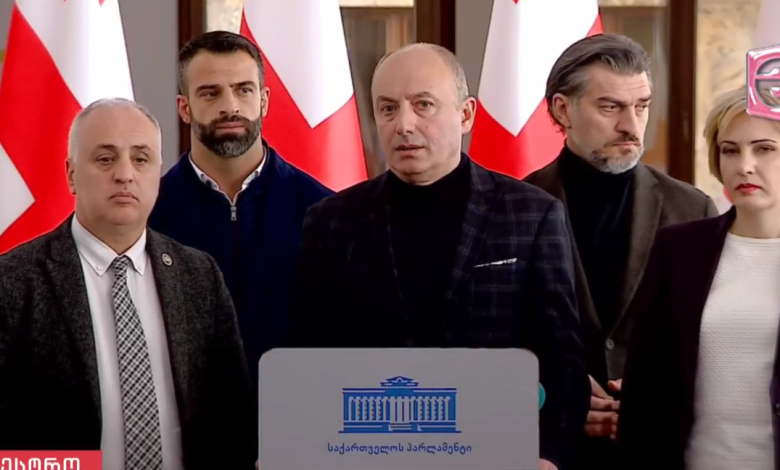
People’s Power Tables Draft Law on Foreign Agents
Representatives of the “People’s Power” faction, formed by the deputies who left “Georgian Dream” but remained in the parliamentary majority, announced on 14 February that they have drafted a bill on the activities of foreign-funded organizations and would officially register it in parliament in the next few days. Civil.ge obtained the draft law from People’s Power.
What is the draft law about?
According to the law entitled “On Transparency of Foreign Influence,” the following entities are to be included in the register of foreign influence:
- Non-commercial legal entities, which are not established by the state and receive 20% of their annual revenue from a “foreign power.” The law does not apply to the National Sports Federation of Georgia or the blood banks.
- Broadcasters under the Law “On Broadcasting” receive more than 20% of the annual total revenue “from a foreign power,” except for sponsorship or commercial advertisement as defined by the Law “On Broadcasting.”
- A legal entity that alone or jointly owns a print media outlet operating in Georgia and which receives more than 20% of annual revenue from a foreign power (excluding commercial advertising placed by companies or individual entrepreneurs);
- Legal entities that own or use, jointly or with others, an Internet domain and/or Internet hosting intended for the dissemination of information through the Internet in the Georgian language and whose total annual revenue from foreign power exceeds 20% (excluding the income received from commercial advertising placed by the entrepreneurial company or individual entrepreneur).
- For the purposes of this law, both financial support and in-kind contribution count towards the foreign power funding quota of 20%. In-kind contributions are to be evaluated by their market price.
According to the draft law, the following are considered foreign powers:
- Agencies of foreign governments;
- Individuals who are not citizens of Georgia;
- Legal entities that are not established based on Georgian legislation;
- Organizations (including a foundation, association, company, union, etc.) or other associations of individuals established under the law of a foreign state and/or under international law.
Registering as an agent of foreign influence
According to the bill, the entity must apply to the National Agency of Public Registry for registration as an agent of foreign influence in January of a calendar year following the year in which it meets the above criteria.
In addition, the entity registered as an agent of foreign influence must submit an electronically completed financial statement to the Agency in January of each subsequent year.
Evading registration as an agent of foreign influence or failing to submit the financial declaration within the prescribed time limit is punishable by a fine of GEL 25,000 (USD 9,400).
The objective of the bill
The bill’s authors justify its necessity by the requirements of transparency in the activities of agents of foreign influence. According to them, the amendments will not restrict the activity of the entity registered as an agent of foreign influence.
Politicians’ Reactions
The amendments drafted by “People’s Power” prompted differing reactions from the parliamentary majority and the opposition MPs.
Georgian Dream
Georgian Dream MPs supported the initiative, while opposition MPs criticized the proposed changes.
Mikheil Sarjveladze, chairman of the Committee for the Protection of Human Rights and Civil Integration, said that the public has the right to see who is being funded, how, and with what money. “The problem of transparency is real. In any case, not everything is really known to the public about who is financed with what funds, where and how and what these funds are used for”, – he said, adding that the legislative initiative “implies that this area will also be subject to similar regulations.”
Irakli Kadagishvili, chairman of the Committee on Procedural Issues and Rules, noted that if the non-governmental sector demands transparency from the government, “a similar regime [of transparency] will be useful for everyone.” “These procedures have worked in the United States of America for decades,” Kadagidze continued presenting as an example of the lobbying contract by Mikheil Saakashvili’s lawyers, who were duly registered as foreign agents.
Speaking in a late-night talk-show, Irakli Kobakhidze, chairman of the ruling party, said that while the party did not yet meet to elaborate their joint position on the draft law, “as a lawyer” he only sees the interests of transparency reflected in it.
Opposition
Some opposition political parties voiced their criticism regarding the bill.
Khatuna Samnidze of “Republican Party” has slammed the initiative, claiming that if passed, it will jeopardize the country’s EU integration and democracy.
MP Davit Usupashvli, “Lelo” member, noted that the “bill is not submitted by People’s Power but by “Bidzina power,” referring to Bidzina Ivanishvili, the ruling party’s patron. He also said that the main aim of the bill was not to make the funding of NGOs and media transparent but to have a chilling effect on people that are “getting on the government’s nerves” and to “portray them as enemies.”
“They want to copy this law directly from Russia… If you look around, in the 21st century, in the Internet age, if you try to do what they are doing in Russia, why would you want to do it?” This is very incomprehensible to me,” said Aleko Elisashvili, MP for “Citizens”, adding that “this is very worrying.”
MP Iago Khvichia, of “Girchi” noted that this initiative was an attempt to “play with voters” and not “real pro-Russianism,” saying that this was the reason it won’t succeed.
Also Read:
- 18/11/2022 –Anti-Western ‘People Power’ Want to Curb Foreign CSO Funding
- 05/10/2022 – Amb. Degnan Talks Attacks on CSOs, People Power, and De-oligarchization
This post is also available in: ქართული Русский